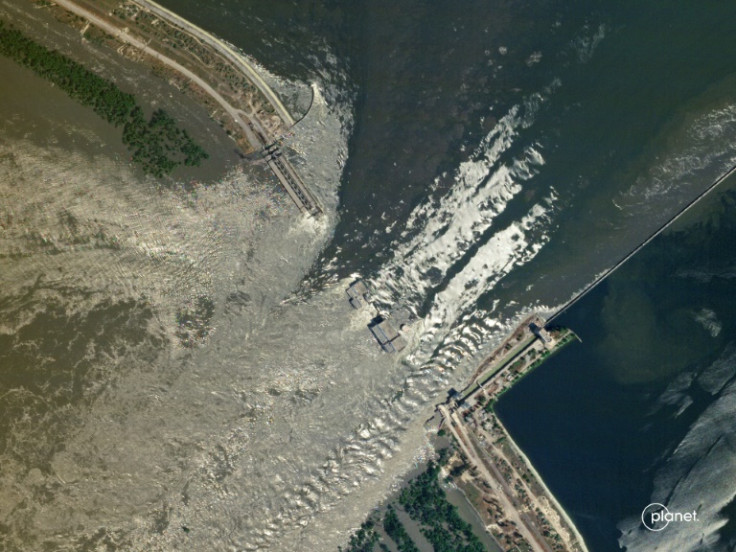Exclusive Drone Footage Shows Presence Of Explosive-Rigged Car At Kakhovka Dam
Russia had the necessary resources, motivation and favorable circumstances that could potentially lead to the collapse of a Ukrainian dam, exclusive drone photos and information obtained by The Associated Press suggest.
The dam collapse occurred while it was under Russian control, raising concerns about Russia's possible involvement in the incident. Aerial images of the Kakhovka Dam, which have been shared with The Associated Press, reveal the presence of a car rigged with explosives positioned on the dam structure. Additionally, two officials have indicated that Russian troops were stationed in a critical section within the dam, supporting the Ukrainian claim that the explosion originated from that specific area.
The Russian Defense Ministry has not responded to these findings, and the claims cannot be independently verified by the International Business Times.
The catastrophic destruction of the dam has resulted in devastating consequences, including fatal flooding, endangered agricultural crops in a region known as the world's breadbasket, compromised access to drinking water for numerous individuals, and triggered an environmental crisis. Ukrainian military commanders have revealed that the dam's collapse has disrupted their strategic plans to target Russian positions as part of an ongoing counteroffensive, causing setbacks in the early stages of their operations.
Both sides involved in the conflict have traded accusations regarding the destruction of the dam. However, the Russian allegations suggesting that it was targeted by a missile or intentionally demolished with explosives do not fully explain the magnitude of the explosion, which was significant enough to be detected by seismic monitoring devices in the surrounding area.
The destruction of the Nova Kakhovka dam on the Dnipro River, located approximately 20 miles east of Kherson, has sparked a large-scale humanitarian and environmental disaster across southern Ukraine.
Andriy Yermak, the head of the Office of the President of Ukraine, referred to the act as an "ecocide."
The massive flooding that occurred after the dam's explosion seemed to coincide with Russia's occupation of certain areas, leading to speculation about possible benefits for Russia. The overall impact and implications of the flooding, including any potential advantages or disadvantages for Russia, are complex and multifaceted.

According to two Ukrainian commanders who were present in the area but stationed at different locations, the rising waters resulting from the dam's destruction overwhelmed both Ukrainian and Russian positions.
Humanitarian Coordinator Denise Brown expressed a firm commitment on behalf of the UN to continue providing relief efforts, stating that they will "do all they can to reach all people – including those suffering as a result of the recent dam destruction – who urgently need life-saving assistance, no matter where they are."
In the past few weeks, Ukraine's armed forces have reported modest progress in their counteroffensive efforts aimed at reclaiming territories occupied by Russian forces since the invasion that began in February 2022.
© Copyright IBTimes 2024. All rights reserved.











